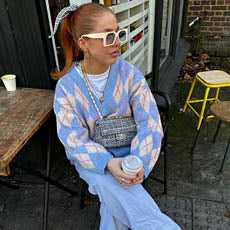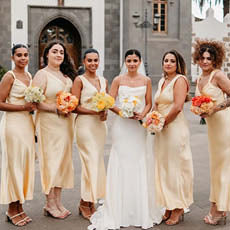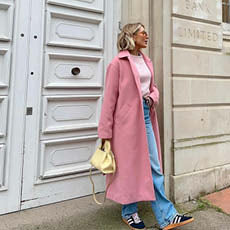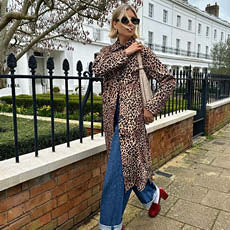of a garment’s environmental impact is estimated to be determined at the design stage.

We believe in fashion that doesn't cost the earth.
Fashion is one of the world’s worst polluters. It is estimated to account for up to 10% of global carbon dioxide output — more than international flights and shipping combined. Along with millions of tonnes of textiles ending up in landfill every year, its impact is catastrophic. If we can improve the ways it works, this could make a truly positive difference to the future of our planet.
Read our latest Sustainability Report here.
We created OMNES to help change the way we shop, wear and
think about fashion.
To show that fashion can be good quality, affordable AND responsibly made and to prompt discussion and broader change across the industry. OMNES means ‘all’, our brand is for everyone and speaks to how we are all in this together. We want to re-think fashion. We want to do fashion differently. We want to make fashion better.
Together.
Sustainability starts with design - envisioning garments that will last, made from responsibly grown and sourced materials.
From the design stage, we choose quality fabrics that are responsibly grown, sourced and manufactured, prioritising natural, recycled and deadstock materials.In the production of garments, we partner with suppliers that treat their workers fairly and have been individually audited and approved when it comes to Health and Safety, Environment, Business Ethics and Labour Standards. Even when it comes down to considering the full lifecycle of a product - wherever possible we design with natural fabrics that will biodegrade, or 100% mono fibres instead of blends so that when technology catches up, they will be easier to recycle into new materials.


We have partnered with the climate organisation Earthly since 2020 to measure the carbon impact of our operations, and offset it through investing in nature-based projects that remove carbon, restore biodiversity, and support the communities most impacted by climate change.
But to go beyond climate neutrality, Earthly asks that you remove at least 110% of your carbon footprint. We started by offsetting 110% of our operational carbon footprint, then decided to go even further by expanding the scope of calculations and offsetting 125% of our calculated impact. More information and data can be found in our sustainability report.
We have so far chosen to support two projects:
- REDD+ Brazil Nut Concession is a project run by Bosques Amazonicos SAC (BAM). This project aims to reduce deforestation in over 300,000 hectares of the Peruvian Amazon and reduce millions of tonnes of CO2 from entering the atmosphere due to illegal deforestation.
- The Rimba Raya Biodiversity Reserve project run by InfiniteEARTH is protecting one of the most highly endangered ecosystems in the world. Without this project, the carbon-rich, peatland forest of Rimba Raya would have been turned into palm oil estates, emitting over 100 million tonnes of carbon into the atmosphere.
The Rimba Raya Biodiversity Reserve project by InfiniteEARTH
The Rimba Raya Biodiversity Reserve project is protecting one of the most highly endangered ecosystems in the world. Without this project, the carbon-rich, peatland forest of Rimba Raya would have been turned into palm oil estates, emitting over 100 million tonnes of carbon into the atmosphere. Instead, the project is protecting the land and working with local communities to achieve all 17 of the Sustainable Development Goals.
Developed by InfiniteEARTH in 2009, Rimba Raya protects over 640 square kilometers (250 square miles) of High Conservation Value (HCV) tropical peat forest, with over 350 million tonnes of carbon stored in their peat domes. The measurable contribution to emission avoidance is the equivalent of removing one million cars from the world’s highways every year for the next 30 years!
As well as playing a huge role in climate mitigation, peatlands are home to rare organisms found nowhere else, and they contribute to reducing floods, droughts and wildfires, all expected to increase as the climate changes. This project is committed to proactively working with local communities to not only preserve the peatland and surrounding wildlife, but to support sustainable development and ensure people and nature can survive and thrive into the future.

In order to truly consider ourselves a responsible brand, it was important to us to calculate the carbon footprint of our operations, but to go beyond simple carbon offsetting and carbon neutrality.
You ask how?
We want to support our supply chain partners to
be the best at what they do.
Creating clothes for us is a partnership with our suppliers and factories, and when you work in partnership there is a mutual trust and respect for everyone involved.
We are dedicated to ensuring, as far as we can, that our work does not impact the environment or the people we work with in a negative way.
That is why every producer we work with is audited and has signed our partnership policy, which outlines our stringent standards that must be met under the categories of people, planet and product.
Learn more about our producers and who we work with here.
... and so wherever possible we choose to use natural fabrics that can biodegrade back into nature, or mono fibres over blends that could be easier to recycle.
But above all, we only use quality fabrics that are grown, sourced and manufactured responsibly, prioritising organic, natural, recycled and deadstock materials including LENZING™ ECOVERO™ viscose, certified organic cotton, linen, certified recycled polyester, and responsibly sourced wool.

We want
of the clothing we create to be part of a circular fashion system
We seek to understand our social and environmental impact.
We try to work with fabric mills that are audited and advised annually on their energy, waste, water and emission management as part of the Sustainable Apparel Coalition, through which members commit to measuring and improving social and environmental sustainability impacts. And for our eye-catching prints we use OEKO-TEX Standard 100 and Global Organic Textile Standard approved printers to digitally print our designs, saving water and energy and ensuring no toxic chemical substances are used in our printing process.
Learn more about our materials here.

During our printing process
we are
saving
water and energy
and ensuring
no toxic chemical substances are used.
That’s why OMNES packaging is made from recyclable card that is made from a mixture of waste-paper and wood pulp which has been sourced from a responsibly managed man-made regenerated forest. This means our boxes are FSC mix and FSC recycled certified.
But while the packaging items are sent in is an obvious issue, have you thought about what the labels in your clothes are made from?
Global plastic waste more than doubled between 2000-2019 and much of this waste ends up in rivers and oceans.
OMNES labels are all made from recycled plastic that has been removed from the ocean. Our labels are woven from yarn that began its life as waste plastic bottles. After the PET plastic bottles are collected, they are cleaned, crushed and turned into a new certified recycled polyester.
We are proud of this commitment, and we encourage all our suppliers and contractors to implement the Living Wage in their respective region. Although not all companies around the world pay this, at OMNES we ensure all our producers outside the UK are audited annually by independent third parties, so we can ensure that even the people who are indirectly employed by OMNES are being treated and paid fairly.
Our producers are audited by globally recognised organisations including Sedex, one of the world’s leading ethical trade membership organisations, working with businesses to improve working conditions in global supply chains.

We are proud to be a Living Wage Employer, ensuring all our direct employees receive a liveable wage for their region.
We believe in treating animals with
respect and compassion.
We are committed to never using materials that induce the suffering or killing of animals.
We therefore do not, and never will, use any animal skins, fur, silk, feathers or down, angora, mohair, or horn buttons in our designs.
Animal welfare is a key concern when sourcing animal-based materials such as leather and wool, and the traceability issues linked to the industry can make it difficult to identify animal welfare breaches in supply chains.

We do, however, prioritise the use of biodegradable natural fibres as we strive to select materials with the lowest possible lifecycle environmental impact, and as such are in support of using wool in our collections where strict requirements are met.
You can read our full animal welfare policy here.

Working towards a better
future for all.
At OMNES we seek to innovate, improve, learn and, hopefully, educate. So that every time and everywhere you shop, you will know the best fabrics to look for, the styles that suit you and how to ensure they will last longer. We are constantly striving to be as socially responsible and environmentally sustainable as possible. To help you look good and really feel good. Feedback is invaluable to us in our journey, if you like what you see or might suggest a way we could do better, get in touch with us here.
You can view our latest Sustainability Report here.

We’re proud to make clothes as responsibly as we possibly can. But we need your help to keep them in use.
















